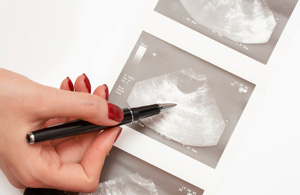Prenatal Diagnosis

Ultrasound (or “sonogram”) is a test that uses sound waves reflected from the baby to create a picture of the baby on a special computer screen. While ultrasound does not provide a crystal clear picture of the baby, by 16-18 weeks of pregnancy it does enable a doctor, skilled in interpreting sonographic images, to identify some physical types of birth defects such as limb abnormalities, heart defects, and some abnormalities of the brain and spine.
As a comprehensive State Prenatal Diagnostic Center (PDC), Genetics Center is a single source of services for all phases of the California Prenatal Screening Program. At our center in Orange, California, patients can conveniently have their blood sample collected and any elected follow up services performed such as genetic counseling, ultrasound, and chorionic villus sampling (CVS) or amniocentesis.
Chorionic villus sampling (CVS) is an early prenatal diagnostic test used to identify chromosome abnormalities, and it can also be used to identify certain other genetic disorders in the baby as early as 10-12 weeks of pregnancy. The test is performed by guiding a thin, flexible tube (“catheter”) through the woman’s vagina and cervix to the early placenta. A very small sample of placental tissue (chorionic villi) is obtained for laboratory analysis. This chorionic villi originates from the fertilized egg and thus has the same genetic makeup as the fetus.
“Routine” amniocentesis is a prenatal diagnostic test performed at 15-20 weeks of pregnancy. Amniocentesis detects chromosome abnormalities and can also identify certain other genetic disorders in the baby. Additionally, amniocentesis can detect approximately 95 percent of neural tube defects (such as spina bifida and anencephaly).
The test involves placing a very fine needle through the woman’s abdomen (not through the navel) into the amniotic sac. A small amount of amniotic fluid is withdrawn from the sac and sent to the genetics laboratory for processing. Amniotic fluid contains fetal epithelial cells that carry the genetic material of the fetus.
Your Well-Being is Our Priority
Three to four out of every 100 babies is born with some form of birth defect, major or minor. Some of these birth defects can be prevented, but most cannot. However, many may be detected before birth. This process of testing for birth defects and genetic conditions during pregnancy is referred to as prenatal diagnosis. Identifying certain birth defects and genetic conditions before a baby is born may enable a couple and their doctor to make decisions regarding the management of the pregnancy.
There are a number of prenatal tests including ultrasound, the California Prenatal Screening Program, chorionic villus sampling, and amniocentesis which are performed at different gestations of pregnancy. There are benefits, risks, and limitations with all prenatal tests. There are many things to consider in determining what testing may be offered such as family and pregnancy history, age, and results of prior routine pregnancy tests. A genetic counselor can review this information with patients to facilitate educated decisions regarding prenatal diagnosis. Please do not hesitate to contact us for more information.

